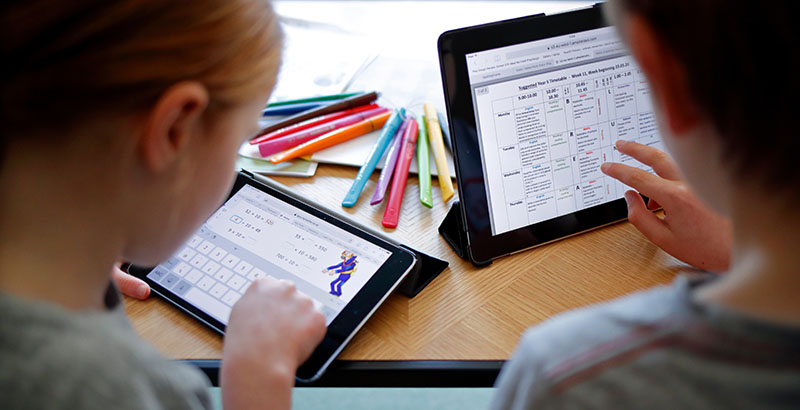A Mom’s View: Some Families Have the Resources to Manage Online Learning for Their Kids. Too Many Others Do Not. Where Is the Equity in That?

It’s just after lunchtime on the first day of our #coronapocalypse quarantine, and my phone has been ringing off the hook. Parents, colleagues and friends are understandably concerned. Everyone is seeking advice from their resident cognitive scientist, former classroom teacher and current associate teaching professor on how to continue to learn online during this crisis. And while the emergence of tech tools has ushered in new ways of learning, I wonder: Whom have these tools left out along the way?
With access to a laptop and broadband, students can experience spectacular events in history and visit locations across the universe with the flick of a finger. Free tools like Nearpod and Flipgrid provide creative opportunities for sharing information and connecting learners. So in preparation for this crisis, my partner and I sat with our children, ages 11 and 9, to discuss the coronavirus pandemic and co-create what learning would look like over the next month.
In just one morning, they flew through nearly a quarter semester of math thanks to Khan Academy’s free tools (and nifty day planner). In a matter of 45 minutes, they’d completed several units using ratios, rates and percentages to create a visual story about how closing schools mitigates the spread of the virus. Using the free design tools from Canva, my children created an infographic to share data about rates of infection.
On deck: learning to identify accurate information and visually communicate science-based data on the virus’s spread; gaining familiarity with the art and act of storytelling by sharing their own experiences and practicing taking the perspective of another; and designing a visual history of our world through the lens of both science and history.
Because of this pre-planning, I was able attend regular meetings from the comfort and safety of my home — a privilege. We’ve had to check in on our kids to provide support, redirect their activities and even break up a few arguments. But most of my check-ins involve watching in awe at the remarkable learning that’s unfolding. Yet I know my children are not magic. They are simply privileged to be able to access tools and support that will help them learn while their school is closed.
Where is equity in learning when only privileged children have access to resources, tools, space and materials for co-creating knowledge? And what assumptions are we making when we assume that this is the type of learning every child needs?
More than 2 million students lack access to the broadband necessary to access most content while in school. Access from home is even more inequitable, with less than two-thirds of rural Americans having broadband and only 54 percent of those whose income is less than $30,000 a year having access to a computer. How useful is expertly curated content if only the haves can get it?
This only exacerbates the inequity of learning when education goes online. It makes visible the systemic issues we have as a country when more than one-third of Americans are one paycheck away from being homeless. And what about the nearly 7 million students whose services under the Individuals with Disabilities Education Act are being disrupted? It is still unclear how these students will safely receive their needed special education services, and how learners who rely on school-based social workers to process issues from abuse to bullying will get the social and emotional support they require to survive.
Learning is not solely a cognitive endeavor. A student cannot learn when depressed, afraid or hungry. Where is the equity in access to food without stigma during this crisis?
In the midst of this current crisis, droves of incredible humans have come forward to share their talents with an increasingly isolated world. The Cincinnati Zoo has started streaming a Home Safari Facebook Live, starting with its darling hippo Fiona. And while the Kennedy Center is closed, children’s author Mo Willems is hosting a virtual Lunch Doodles series to keep young learners engaged during these strange times.
When this pandemic passes, what story will we tell as educators and as citizens of the world? How will we have served children who lack access to resources or whose parents have lost their jobs — or, worse, their home — as a result of this crisis?
How will we create more equitable systems for our children to access food, medical support and a free and appropriate public education during the next crisis? And how will we prepare our learners to become advocates for their own needs once they are no longer part of our compulsory education system?
This time of crisis highlights the fragility of our systems of education, health care and financial mobility. It can also be an opportunity to advocate for social services that should be a right for all humans.
Dr. Lindsay Portnoy is a cognitive scientist, an educator, a public school parent and president of her local school board.
Get stories like these delivered straight to your inbox. Sign up for The 74 Newsletter

;)